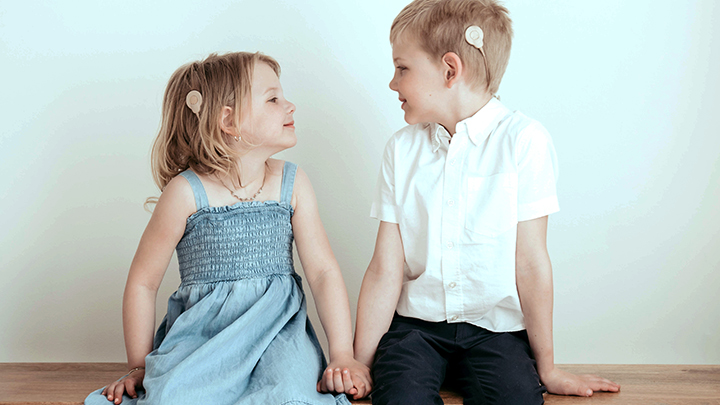
October 30, 2023

Annalia and Caleb Bohl both live with permanent hearing loss. While Annalia’s loss was caught early through Alberta’s Early Hearing Detection and Intervention Program, her brother Caleb’s was caught much later. “The timing of when Caleb and Annalia received their diagnosis has had a profound impact on their development,” says their mother Kristen. “Annalia’s speech is much further along than Caleb’s, but they’re both learning and adjusting to the world around them.”
Story by Vanessa Gomez
CALGARY — Kristen Bohl and her family have a unique experience with Alberta’s Early Hearing Detection and Intervention Program – their daughter Annalia’s hearing loss was caught early thanks to the program, while her older brother Caleb had a delayed diagnosis prior to the program’s existence.
Caleb was born in August 2016 and spent 12 days in the NICU.
“We were going to all of his appointments, but at a year-and-a-half, my husband mentioned Caleb wasn’t hearing us,” says Kristen. “We brought up the concern with a nurse, but it was difficult to get accurate testing at the time, due to his age. He’d already started to learn body language, lip reading and how to respond to people, which confused everyone.”
Eventually, Caleb was referred to the Alberta Children’s Hospital, where he was diagnosed with permanent hearing loss — and the Bohl family began their journey to help Caleb through his new diagnosis.
Six months after Caleb’s diagnosis, his little sister Annalia was born in August 2018. Unlike Caleb, she was screened at two days old and diagnosed with permanent hearing loss soon after.
“When we got the diagnosis for Annalia, it was a hard for our family,” adds Kristen. “It’s a very isolating diagnosis, but as Annalia and Caleb grow, they’ll have each other to lean on for support.”
Hearing is important for many areas of child and brain development. Finding hearing loss early can help prevent delays in a child’s speech, learning and social skills. All babies born or living in Alberta are offered screening for permanent hearing loss, within 90 days of birth.
“The timing which Caleb and Annalia received their diagnosis has had a profound impact on their development,” says Kristen. “Annalia’s speech is much further along than Caleb’s, but they’re both learning and adjusting to the world around them.”
Today, both children, now ages 7 and 5, have been fitted with cochlear implants. They attend speech-language services. The siblings attend Deaf and Hard of Hearing school programs, with a goal to get them into their community schools.
As they grow, they’ll be taking more responsibility for their devices, such as learning how to put them on themselves and take care of the batteries.
While their experiences with hearing loss are unique, their days with the family are pretty normal.
“Annalia loves to dance and sing and she’s such a chatterbox making up music and songs,” says Kristen. “Caleb is super-curious and always has an interest in how the world works. He loves to build things with Lego.”
Kristen would like other parents to know how important screening is for hearing loss.
“It’s overwhelming how many appointments you go to as a new mom, but they’re all so important. If your child has a rare diagnosis, it becomes your whole world — but you get to give them the head start they need to reach the important milestones.”
October is Audiology Awareness Month. Learn more about Alberta’s Early Hearing Detection and Intervention Program.